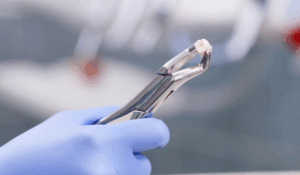
While tooth extraction is a routine dental procedure, complications can occasionally occur. As a dentist who has performed thousands of tooth extraction procedures in Pickering, understanding potential risks helps patients make informed decisions. Moreover, being aware of possible complications allows both patients and dental professionals to take appropriate preventive measures. Therefore, this comprehensive guide explains common tooth extraction complications and proven strategies to prevent them.
Common Tooth Extraction Complications Patients Should Know
The most frequent complication following tooth extraction is dry socket, affecting approximately 2-5% of patients. Additionally, infection can develop when bacteria enter the extraction site during healing. Furthermore, nerve damage, though rare, may occur during complex tooth extraction procedures involving wisdom teeth or deeply rooted molars. Moreover, sinus complications can arise when removing upper back teeth due to their proximity to the sinus cavity. However, understanding these tooth extraction risks enables better preparation and prevention.
Dry Socket: The Primary Tooth Extraction Complication
Dry socket occurs when the protective blood clot at the tooth extraction site becomes dislodged or dissolves prematurely. Consequently, the underlying bone and nerves become exposed, causing intense throbbing pain. Additionally, this complication typically develops 2-3 days after the tooth extraction procedure. Furthermore, certain factors increase dry socket risk, including smoking, oral contraceptives, and aggressive rinsing. Therefore, following post-operative care instructions carefully significantly reduces the likelihood of this painful tooth extraction complication.
How Dental Professionals Minimize Tooth Extraction Risks
Proper patient evaluation forms the foundation of safe tooth extraction procedures. Before any tooth extraction, dental professionals thoroughly review medical history and current medications that might affect healing. Additionally, detailed X-rays help identify potential complications such as curved roots, bone density issues, or nerve proximity. Furthermore, discussing lifestyle factors like smoking habits allows for personalized risk assessment. Moreover, this comprehensive evaluation enables modification of the tooth extraction technique to minimize potential complications.
Advanced Surgical Techniques for Safer Tooth Extraction
Modern tooth extraction techniques significantly reduce complication rates compared to traditional methods. Consequently, specialized instruments minimize trauma to surrounding tissues during the procedure. Additionally, sectioning teeth into smaller pieces often prevents excessive force that could damage adjacent structures. Furthermore, gentle tissue handling and proper irrigation help maintain the extraction site’s integrity throughout the tooth extraction process. Moreover, these refined surgical approaches result in faster healing and fewer post-operative complications.
Preventing Infection After Tooth Extraction Procedures
Infection prevention begins before the tooth extraction procedure starts and continues throughout recovery. Therefore, antibiotics may be prescribed for patients with certain medical conditions or compromised immune systems. Additionally, maintaining strict sterile protocols during tooth extraction reduces bacterial contamination risks. Furthermore, proper wound management and closure techniques help protect the extraction site from harmful bacteria. Moreover, patient education about post-operative care plays a crucial role in preventing infection after tooth extraction.
Patient Guidelines to Reduce Tooth Extraction Complications
Patient actions following tooth extraction significantly impact the healing process and complication rates. First, avoiding smoking for at least 48-72 hours is essential, as tobacco use dramatically increases dry socket and infection risks. Additionally, patients should avoid using straws or spitting forcefully, as these actions can dislodge protective blood clots. Furthermore, maintaining gentle oral hygiene around the tooth extraction site while keeping the area clean promotes proper healing. Moreover, taking prescribed medications exactly as directed helps prevent infection and manage pain effectively.
Managing Nerve-Related Tooth Extraction Complications
Nerve damage during tooth extraction, while uncommon, requires immediate recognition and appropriate management. Consequently, dental professionals carefully map nerve locations using advanced imaging before complex extractions. Additionally, symptoms like persistent numbness, tingling, or altered sensation need prompt professional evaluation. Furthermore, early intervention often improves outcomes when nerve-related complications occur after tooth extraction. Moreover, most nerve-related issues resolve within several weeks to months with proper care and monitoring.
Sinus Issues Following Upper Tooth Extraction
Upper molar tooth extraction occasionally creates communication between the oral cavity and sinus space. Therefore, special precautions are taken when removing teeth near the sinus floor to prevent perforation. Additionally, immediate recognition of sinus communication allows for proper management during the tooth extraction procedure. Furthermore, most small perforations heal naturally with appropriate post-operative care and precautions. Moreover, larger openings may require surgical closure to prevent chronic sinus problems following tooth extraction.
Warning Signs Requiring Professional Attention After Tooth Extraction
Certain symptoms following tooth extraction warrant immediate professional evaluation and treatment. Severe pain that worsens after the third day may indicate dry socket or developing infection. Additionally, persistent bleeding beyond 24 hours requires professional assessment and intervention. Furthermore, signs of infection such as fever, facial swelling, or foul taste need prompt treatment. Moreover, any unusual numbness, tingling, or altered sensation should be reported immediately following tooth extraction.
At Bayly Dental Clinic, safe tooth extraction procedures are prioritized through careful planning, advanced techniques, and comprehensive patient care. The experienced dental team minimizes complications while ensuring patient comfort throughout the entire process. For tooth extraction needs or concerns about potential complications, contact the practice at (905) 492-1234 to discuss specific situations with the qualified dental professionals in Pickering.
